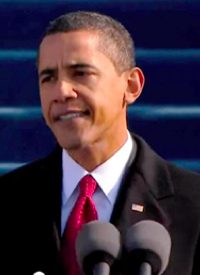
“The importance of video is so new for campaigns, even relative to ’08,” Teddy Goff, the Obama campaign’s digital director, told the Times. “Now it’s in some ways the primary way our digital operation communicates with supporters. And increasingly it will be the primary way we communicate with undecided voters.”
The Mitt Romney campaign is also using Web videos with technology that allows Internet viewers to donate, volunteer, and post messages, all on the candidate’s YouTube page. The Romney camp has produced roughly two videos a week thus far in the former Massachusetts Governor’s quest for the Republican presidential nomination.
Television is still the main way for candidates to reach voters with their messages and is likely to remain so for at least the near future. Candidates are expected to spend about 10 percent of their advertising budgets this year on websites, however, where they can connect with interested voters who are not changing channels during commercials of fast-forwarding through programming on their digital video recorders.
The Obama video debuting this evening, entitled The Road We’ve Traveled, is 17-minute documentary narrated by Hollywood film star Tom Hanks. It was directed by Davis Guggenheim, the Oscar-winning director whose film credits include Waiting for Superman and An Inconvenient Truth, the Academy Award-winning documentary that featured former Vice President Al Gore and his claims about climate change.
Unlike the 2008 campaign, when then-Senator Barack Obama spoke of healing the planet and stemming the rise of the oceans, the trailer released on the new video focuses on the struggle the incoming administration faced when Obama succeeded George W. Bush in January 2009 in the midst of a stagnant economy, rising deficits, and the collapse of financial institutions and the auto industry. It begins with a scene of Obama and the first family advancing toward a podium in front of a large, cheering crowd, while the narrator asks: “How do we understand this President and his time in office? Do we look at the day’s headlines or do we remember what we as a nation have been through?”
The implication is that, as bad as the day’s headlines may be, they may not appear so bad if viewed in the broader context of the problems facing the nation when Obama became President and what the President has done regarding these problems. But have the headlines really improved since Obama became President? And if the answer is yes, did Obama’s policies contribute to, or hinder, that improvement?
Consider, for example, the federal fiscal crisis. TheNewAmerican.com recently published a story under the headline “February’s Deficit the Highest Ever,” which reported that the federal budget deficit just for the month of February was $229 billion according to a report released by the Congressional Budget Office. The same article also reported that the budget Obama submitted last month estimated that the annual deficit will be $1.327 trillion for the current fiscal year. Even taking into account the state of the nation when Obama became President, can a trillion-dollar-plus budget deficit in 2012 be viewed as progress?
Of course, the trailer — and presumably the documentary itself — does not say that the federal government’s fiscal crisis shows no signs of abating. Instead, David Axelrod, the President’s senior political adviser, describes the new President facing “an economic crisis beyond anything anybody had imagined.” Elizabeth Warren, former special advisor to the Consumer Financial Protection Bureau and now a Democratic candidate for U.S. Senator in Massachusetts, has a speaking role in the video, addressing the government bailout and partial takeover of the auto industry.
“If the auto industry goes down, what happens to America’s manufacturing base?” Warren asks. “What happens to jobs in America? What happens to the whole Midwest?” The assumption, of course, is that the government bailout and partial takeover were the correct solutions to prevent the auto industry from going down.
Vice President Joe Biden is seen in the trailer stressing the importance of the administration’s health care plan, passed by Congress and signed by Obama in 2010. “If we don’t do this now,” Biden says, “it’ll be a generation before 30 million Americans have health insurance.” Again, the assumption is that ObamaCare — including individual mandates — was exactly what was needed to solve problems in the healthcare industry.
Biden is also heard describing Obama’s decision to go forward with the Navy SEAL operation that, the administration later reported, resulted in the killing of al-Qaeda leader Osama bin Laden. Coming out of a meeting with the “entire national security apparatus,” the President was “all alone,” Biden said. “This was his decision and nobody’s standing with him.” Former President Bill Clinton also has a cameo as he describes the decision to get bin Laden as one he hopes he would have had the courage to make if he had been President at the time.
The video and website may help the President rally his supporters at a time when his approval rating has taken a dip again after rising in the wake of improving job creation numbers earlier this year. The latest Times/CBS News poll shows Obama’s overall approval rating at 41 percent, just one month after he had reached the 50 percent mark. A Washington Post/ABC poll shows a less severe decline, with the President slipping from 50 to 46 percent in the past month. A still sluggish economic recovery and sharply rising gas prices have contributed to the slide.
Photo of President Obama: Screen-grab from trailer


